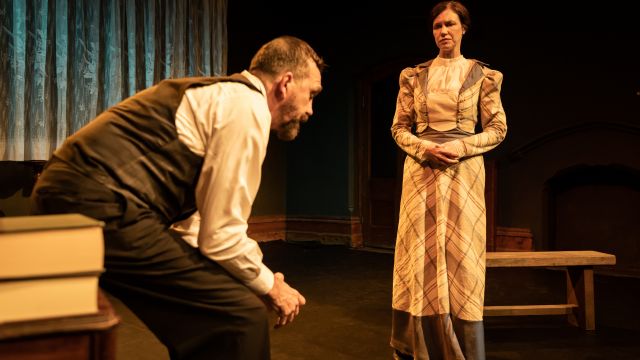Talking to the Future
Alfred Deakin was Prime Minister of the newly federated Commonwealth of Australia 1903 – 1904, 1905 – 1908, 1909 – 1910. Some say Australia’s greatest prime minister. Playwright Darryl Emmerson is clearly an admirer. But let’s be clear: Talking to the Future is not a play; it’s a history lesson and a hagiographic one at that.
It begins pre-Federation and continues up to Deakin’s sad decline and death. With that time span, Emmerson sets himself a considerable task: to select incidents for a one act play when his subject was responsible for so much key and surviving legislation. – and leaving aside his private life. But it’s clear that Emmerson’s choices have been guided by issues that are still pertinent and argued over today – hence the title, and a perfectly good but not sufficient reason to tell Deakin’s story. As the story rolls on, we keep thinking, Plus ça change… ‘

The usual practice, of course, with a biographical subject is the dramatisation of some key episode that represents and epitomises the subject’s life. For instance, in the case of protectionist Deakin, his 1908 ‘Fusion’ coalition with his old Free Trade antagonist George Reid (it was called a ‘betrayal’ at the time – and c.f. Billy Hughes) might well be an incident rich in dramatic potential.
It could reveal the pragmatic survival instincts of this complex but cunning politician, journalist, and patriot who achieved so much – including the White Australia policy, the Factory Act, and Federation itself. And the play does begin and end mysteriously with a séance, including a heavily draped medium (Elizabeth Armstrong) since Deakin was, in addition, a leading ‘spiritualist’ who claimed to have a ‘divine message and mission’. Which does sound familiar.

But in this telling, any conflict (and there was plenty), happens offstage and we are told about it by various narrators: Deakin’s devoted daughter Ivy (Christina McLachlan), his rival, antagonist, and grudging admirer George Reid (Ezra Bix), and his son-in-law Walter Murdoch (Alex Thomson). Possibly as much as two-thirds of the play is narration – and that does become too much like listening to an ardent but dull schoolteacher who is too reverential about her hero.
Comparisons are odious, but older – much older – readers may remember the spirited, innovative, and very funny The Legend of King O’Malley – a concoction that revealed so much about Australian history and politics in a disruptive, iconoclastic romp.

Curiously, Marco Lawrence as Deakin plays – or has been directed to play – his character as a low key, soft-spoken, weary, almost hang-dog individual who speaks in a monotone and achieves what he achieves, as far as we can see, only by the exhibition of high-minded virtue, good manners, rhetoric, and manipulation. Certainly not charm or charisma.
Apart from an early scene with a plumber (Alex Thomson), an ALP man swayed by Deakin’s arguments, all Deakin’s dramatic scenes are with his solicitous daughter Ivy – and we guess the dialogue is probably all quotations. The standout performance – and we wish there had been more of it than one monologue – comes from Ezra Bix’s George Reid. No doubt it’s more quotation, but Bix gives us a twinkling eyed, cynical populist who sucks us in with humour - about the only humour in this otherwise solemn recitation.
Michael Brindley
Photographer: Darren Gill
Subscribe to our E-Newsletter, buy our latest print edition or find a Performing Arts book at Book Nook.

